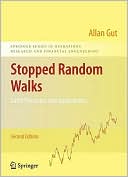

 |

|

Sold Out
Book Categories |
Preface to the 1st edition v
Preface to the 2nd edition vii
Notation and Symbols xiii
Introduction 1
1 Limit Theorems for Stopped Random Walks 9
1.1 Introduction 9
1.2 a.s. Convergence and Convergence in Probability 12
1.3 Anscombe's Theorem 16
1.4 Moment Convergence in the Strong Law and the Central Limit Theorem 18
1.5 Moment Inequalities 21
1.6 Uniform Integrability 30
1.7 Moment Convergence 39
1.8 The Stopping Summand 42
1.9 The Law of the Iterated Logarithm 44
1.10 Complete Convergence and Convergence Rates 45
1.11 Problems 47
2 Renewal Processes and Random Walks 49
2.1 Introduction 49
2.2 Renewal Processes; Introductory Examples 50
2.3 Renewal Processes; Definition and General Facts 51
2.4 Renewal Theorems 54
2.5 Limit Theorems 57
2.6 The Residual Lifetime 61
2.7 Further Results 64
2.7.1 64
2.7.2 65
2.7.3 65
2.7.4 66
2.7.5 66
2.7.6 66
2.8 Random Walks; Introduction and Classifications 66
2.9 Ladder Variables 69
2.10 The Maximum and the Minimum of a Random Walk 71
2.11 Representation Formulas for the Maximum 72
2.12 Limit Theorems for the Maximum 74
3 Renewal Theory for Random Walks with Positive Drift 79
3.1 Introduction 79
3.2 Ladder Variables 82
3.3 Finiteness of Moments 83
3.4 The Strong Law of Large Numbers 88
3.5 The Central Limit Theorem 91
3.6 Renewal Theorems 93
3.7 Uniform Integrability 96
3.8 Moment Convergence 98
3.9 Further Results on Eν(t) and Var ν(t) 100
3.10 The Overshoot 103
3.11 The Law of the Iterated Logarithm 108
3.12 Complete Convergence and Convergence Rates 109
3.13 Applications to the Simple Random Walk 109
3.14 Extensions to the Non-I.I.D. Case 112
3.15Problems 112
4 Generalizations and Extensions 115
4.1 Introduction 115
4.2 A Stopped Two-Dimensional Random Walk 116
4.3 Some Applications 126
4.3.1 Chromatographic Methods 126
4.3.2 Motion of Water in a River 129
4.3.3 The Alternating Renewal Process 129
4.3.4 Cryptomachines 130
4.3.5 Age Replacement Policies 130
4.3.6 Age Replacement Policies; Cost Considerations 132
4.3.7 Random Replacement Policies 132
4.3.8 Counter Models 132
4.3.9 Insurance Risk Theory 133
4.3.10 The Queueing System M/G/1 134
4.3.11 The Waiting Time in a Roulette Game 134
4.3.12 A Curious (?) Problem 136
4.4 The Maximum of a Random Walk with Positive Drift 136
4.5 First Passage Times Across General Boundaries 141
5 Functional Limit Theorems 157
5.1 Introduction 157
5.2 An Anscombe–Donsker Invariance Principle 157
5.3 First Passage Times for Random Walks with Positive Drift 162
5.4 A Stopped Two-Dimensional Random Walk 167
5.5 The Maximum of a Random Walk with Positive Drift 169
5.6 First Passage Times Across General Boundaries 170
5.7 The Law of the Iterated Logarithm 172
5.8 Further Results 174
6 Perturbed Random Walks 175
6.1 Introduction 175
6.2 Limit Theorems; the General Case 178
6.3 Limit Theorems; the Case <$>Z_n = n cdot g(bar Y_n)<$> 183
6.4 Convergence Rates 190
6.5 Finiteness of Moments; the General Case 190
6.6 Finiteness of Moments; the Case <$>Z_n = n cdot g (bar Y_n)<$> 194
6.7 Moment Convergence; the General Case 198
6.8 Moment Convergence; the Case <$>Z_n = n cdot g(bar Y_n)<$> 200
6.9 Examples 202
6.10 Stopped Two-Dimensional Perturbed Random Walks 205
6.11 The Case <$>Z_n = n cdot g(bar Y_n)<$> 209
6.12 An Application 211
6.13 Remarks on Further Results and Extensions 214
6.14 Problems 221
A Some Facts from Probability Theory 223
A.1 Convergence of Moments. Uniform Integrability 223
A.2 Moment Inequalities for Martingales 225
A.3 Convergence of Probability Measures 229
A.4 Strong Invariance Principles 234
A.5 Problems 235
B Some Facts about Regularly Varying Functions 237
B.1 Introduction and Definitions 237
B.2 Some Results 238
References 241
Index 257
Login|Complaints|Blog|Games|Digital Media|Souls|Obituary|Contact Us|FAQ
CAN'T FIND WHAT YOU'RE LOOKING FOR? CLICK HERE!!! X
 You must be logged in to add to WishlistX
 This item is in your Wish ListX
 This item is in your CollectionStopped Random Walks: Limit Theorems and Applications
X
 This Item is in Your InventoryStopped Random Walks: Limit Theorems and Applications
X
 You must be logged in to review the productsX
 X
 X

Add Stopped Random Walks: Limit Theorems and Applications, , Stopped Random Walks: Limit Theorems and Applications to the inventory that you are selling on WonderClubX
 X

Add Stopped Random Walks: Limit Theorems and Applications, , Stopped Random Walks: Limit Theorems and Applications to your collection on WonderClub |